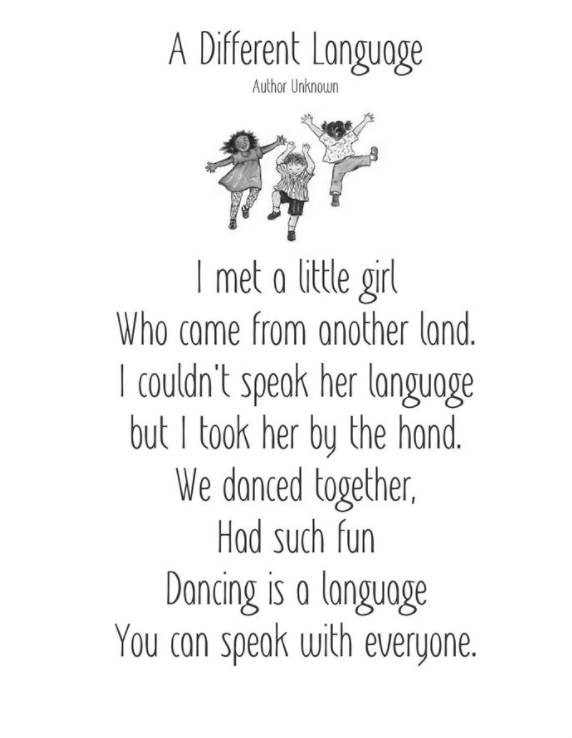Some ideas for European Day of Languages
Today I attended the Trent and Tame Language Hub (TTLH) Primary Launch Event and was asked to share some ideas for European Day of Languages.
I’ve posted a few ideas in the past on my website – have a look at using a song or the Omniglot website – but felt it might be useful if I wrote up some of the ideas I shared in one place for those who weren’t there, and for those who were but would like a reminder!
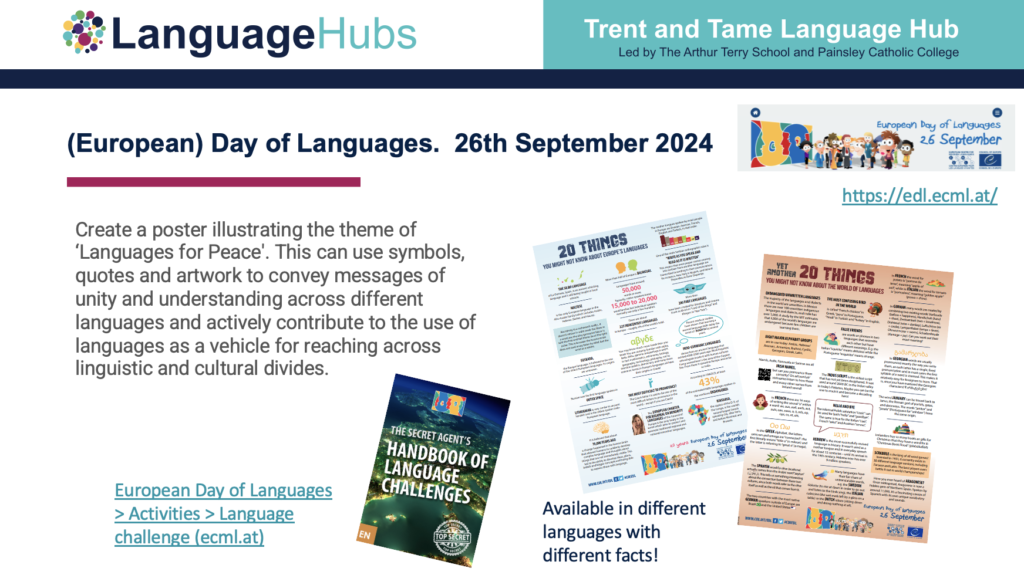
European Day of Languages or EdoL (over recent years the o has been added to avoid misunderstanding!) is celebrated each year on 26th September. It is a Council of Europe initiative and has been running since 2001 and is celebrated across Europe with the aim to promote plurilingualism. Each year there is a focus. This year it is Languages for Peace. You can find out more on the website https://edl.ecml.at/ where there are competitions, resources and opportunities to join with learners across Europe to celebrate our linguistic diversity. This year they include the pronunciation of Irish names and a summary of Words of the Year from various countries. In previous years we’ve used Lara’s Journey and also quests involving the language stickers that are associated with the event.
September 26th isn’t far off the start of the school year so you need to plan ahead, even before you break up for the summer. There are lots of quick ideas that you can use to celebrate that can be the launchpad to bigger/wider initiatives. This is one (the only?) advantage of how soon in the school year it occurs. Below are a few that could create a buzz that can then be built upon.
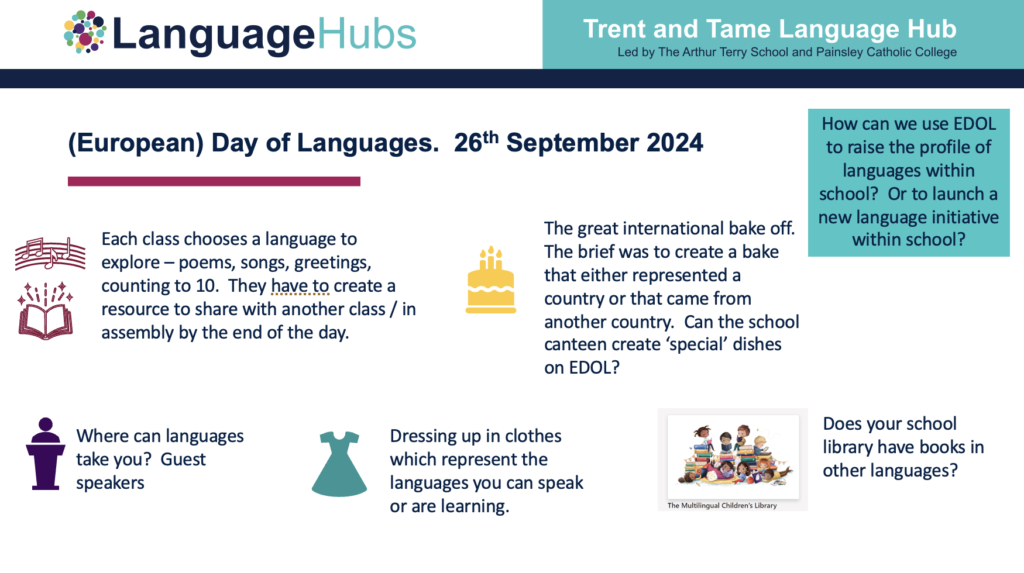
Expanding on a few of those
– you can read about what happened at my school when we each class chose a language in this post from 2008! If you need some help with different languages, the Digital Dialects website is amazing. Also tap into languages known in your school community and ask children, parents and neighbours if they could support you.
– when dressing up, rather than ending up with a legion of French onion sellers and sevillanas dancers, why not ask learners to dress in the colours of or as the flag of a country, or in the national dress of that country, or as a famous person from that country. Stereotypes are worth discussing but not reinforcing!
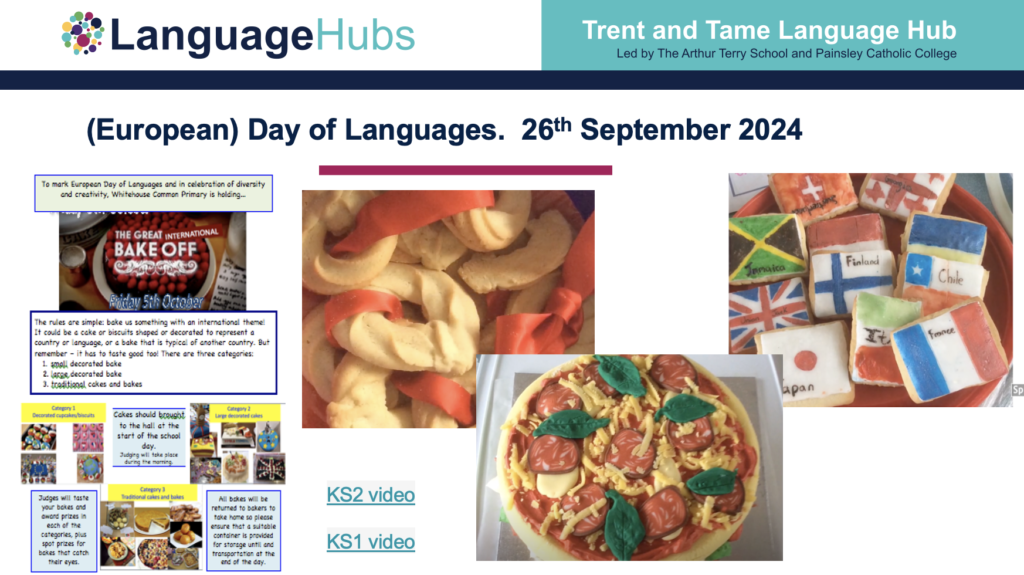
Holding a Bake Off is great fun. We did it a few years ago and I had the pleasure of tasting every one of the more than 50 entries! The brief was to create a bake that either represented a country (flag, colours, in the shape of etc) or that came from another country. As you can see if you watch the compilation videos below, we had some amazing entries and the children really enjoyed it. They do love a competition! It was a shame that we couldn’t let the children eat the cakes due to allergy worries but children took them home (apart from the ones that made it to the staffroom!) It was lovely to see creativity in action but also to celebrate some traditional bakes from Sweden, Germany, Australia, Spain and India.
Another idea that worked well and also had a huge impact on the school was around celebrating linguistic identity and the ‘superpowers’ of many of our learners who already know two or more languages before they learn Spanish with us.
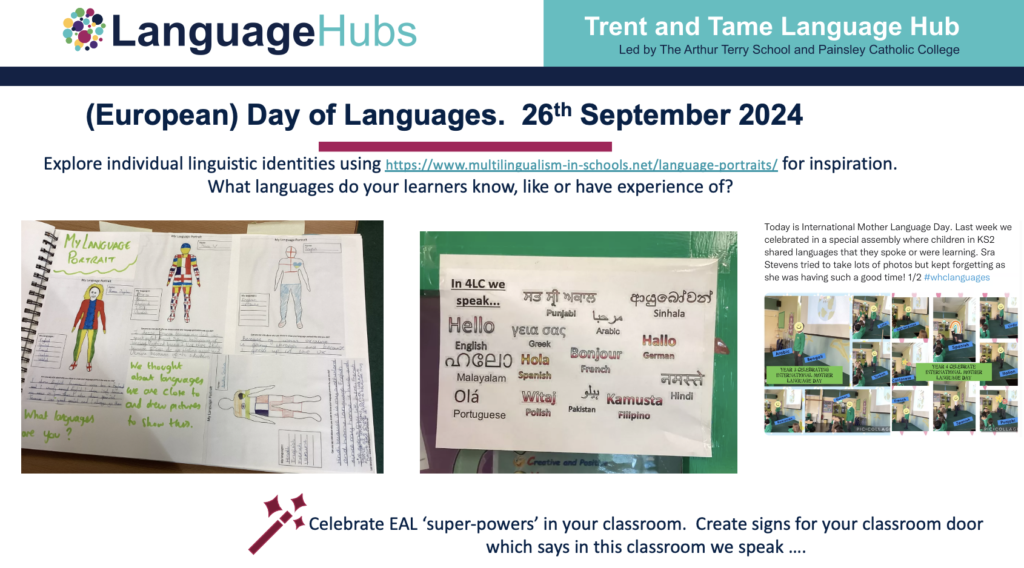
We used the Language Profile template on the Multilingualism in schools website and asked chidlren to consider their linguistic identity – whihc languages do they speak, have they experienced, do they feel a connection with or simply like or enjoy learning? Initially it seemed to many that they only wanted to add English but having talked about it with others, all sorts of feelings came to the surface including solidarity with eTwinning project partners, languages related to reading matter, and some interesting thoughts about being bilingual! This was coupled with finding out which languages were spoken by the children and adults in each class, and the creation of a poster for the door. This led to children learning that there weren’t the only speaker of their home language, and also the revelation of some hitherto unknown skills! Both of these activities feed well into Cultural Capital, British values and celebrating our diversity, all very high on the primary curriculum agenda.
Another idea on a similar theme is to hold a Celebration of Languages in which the learners are invited to share. We’ve had several of these, most recently as you can see above on Mother Language Day. Each time we’ve held the event we’ve had a mixture of songs and rhymes, role plays and greetings and even a clapping game this time. Sometimes children share their home language, sometimes a language that they’re learning or that is ‘in the family’ and sometimes learners have learned something specifically for the event. It takes guts to stand in front of your peers and speak, and I am often struck by how often children who are reluctant to speak in class volunteer to share. It’s quite humbling to see how they value these special language opportunities!
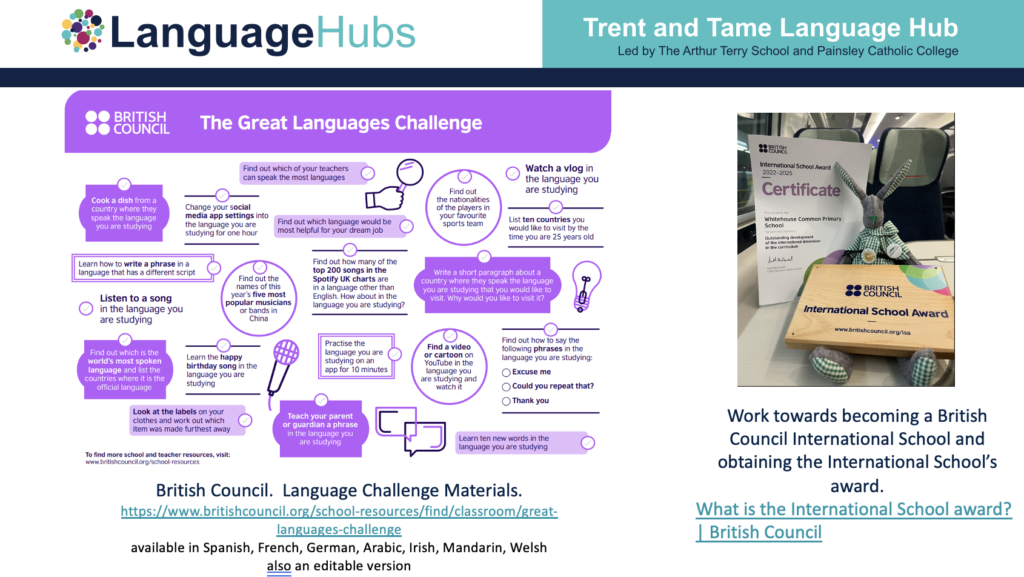
Perhaps you want an activity that can be completed over a week, a little at a time, or that can be set as a homework task, or even a competition. The British Council has a Great Languages Challenge that can be downloaded from the Resource section of their website. As you can see from the image above, it’s available in a language non-specific version as well as one for Spanish, French, German, Arabic, Irish, Mandarin and Welsh. You could ask classes to complete it with learners or groups of learners assigned certain tasks, or set levels for the number of tasks completed eg Bronze might be 8-12, Silver more than 13-17 and Gold for 19 or 20 of the 20 tasks. We awarded certificates for all attempts and small prizes like stickers, pencils, rubbers with books for those who had completed the task independently. We also celebrated and shared in assembly including a memorable rendition of Happy Birthday in Yoruba! Activities like this can count towards a British Council International School Award (ISA). You can find out more about how the requirement and how to apply (it’s free!) on the website but feel free to comment or message me if you need support as I’m a British Council Ambassador and have been trhough the process several times, most recently in 2022.

Last year the Global School Alliance held a competition to celebrate EdoL, asking learners to complete the sentence ‘For me, learning a language is…’ in any way that they wanted – using art, video, poem or song, writing an essay or creating a poster. Entries were uploaded to the GSA platform so all participating schools could share the results, and an award ceremony was held online to celebrate and congratulate the participants and winners. Some of the entries were amazing, and I was overjoyed that two of my pupils earned a ‘special mention’ in the Primary category for their entries. You can watch the video below – our bit is at 24 minutes! I’m sure that there will be another event in 2024 so keep your eye on https://www.globalschoolalliance.com/ for news. However, there’s nothing to stop you holding your own competition with the same sentence to be completed!
Perhaps you’d like to use EDoL to dip your toe into cross country links. A good way to do that is to explore the Global School Alliance. Once registered you can browse other registered schools, look at project ideas or post your own. It’s an excellent way to find a partner (or more!) for a short exchange – perhaps you could exchange a culture postcard from your schools, or meet online to teach other greetings, or work on a common theme of peace for example. The initial activity might be so successful that you want to take it further but equally it could be that short!
Let’s be honest, school life is busy and it’s not always easy to plan and/or fit in activities that can be done by classes but each year I make sure that we at least hold an assembly that celebrates EDoL. In fact, it’s now on the school calendar so I have little choice! If we’ve held a day or week of activities, we share what we have done and celebrate our learning. I’ve mentioned above our Celebrations of Language but we’ve also had ones that have been done in classes based around books – can you identify the titles of these books and the languages in which they’re written?
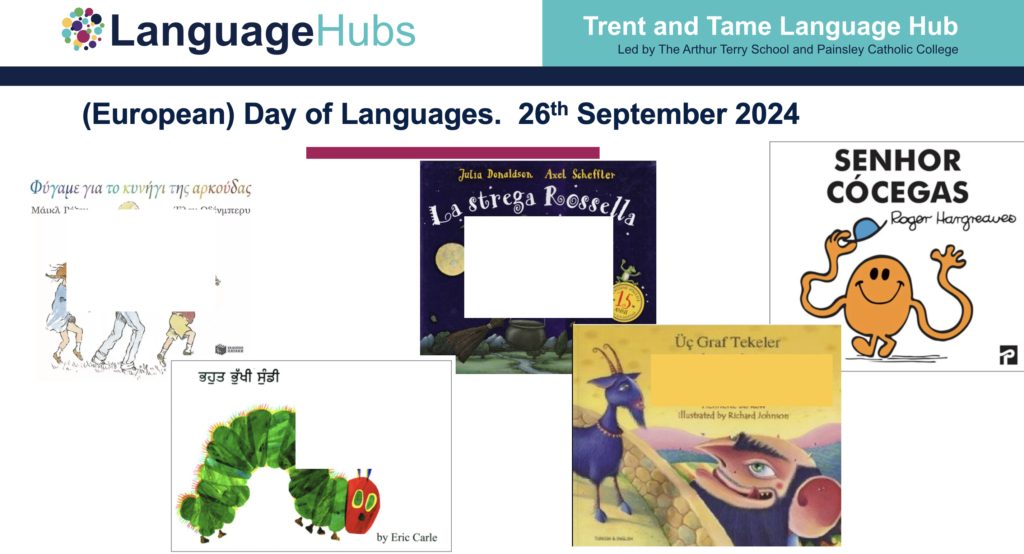
This year I took inspiration from the British Council resource Let’s Talk about Languages which begins with a song fromThe Little Mermaid in many different languages then has a guessing game based on the (literal) meaning of a variety of words including barbe à papa (Dad’s beard – candyfloss in French) and buwchgochgota (short red cow – ladybird in Welsh) I was inspired to continue on this theme and explore favourite words in English as well as other languages.
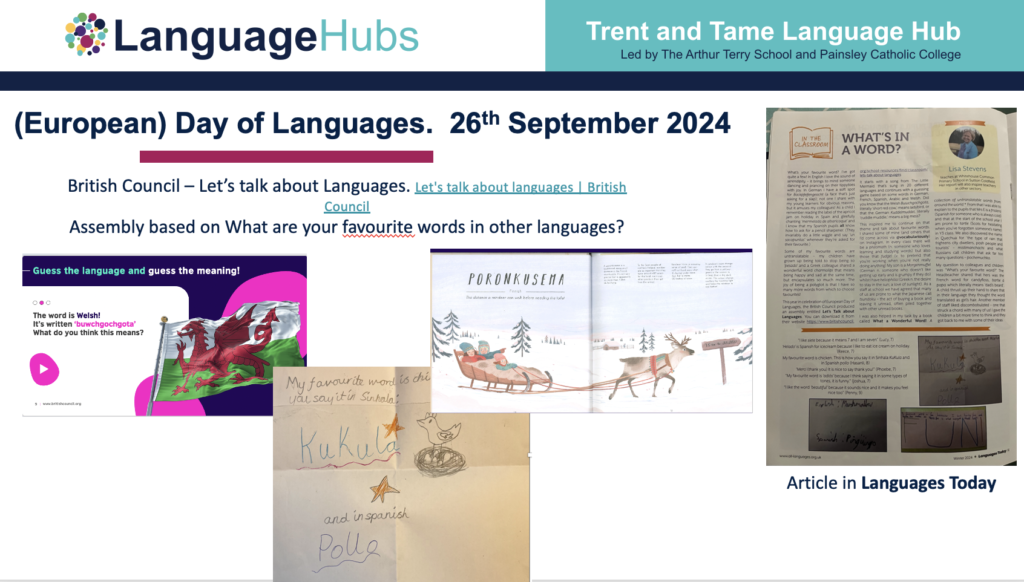
I shared some of mine – serendipity (English) and burbuja (Spanish for bubble) because I love the sound of the words, the untranslatable pesado in Spanish and so on. I was helped by a couple of books I have called What a Wonderful Word! and What a Wonderful Phrase! that revealed words like poronkusema which is the distance that a reindeer can walk without needing a wee (a popular revelation!) I asked staff for their favourite words and several shared, and then asked the children for theirs. Some had an immediate idea but I invited anyone who wanted to share their word to write it down and give it to me during the week. Below are some that I collated for an article I wrote about it for Languages Today, published by ALL.
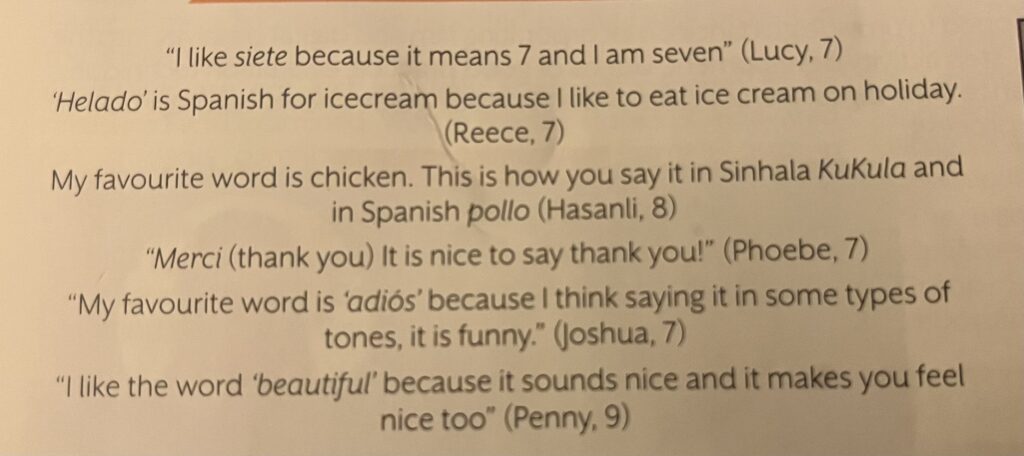
There are many more things you could do to celebrate. I haven’t decided how we will mark EDoL in September yet but perhaps I’ll go back to past post and explore Silbo Gomero, a whistling language that is used on La Gomera. Whatever we do, I’m glad of the prompt to have a think and start planning.
If you have any ideas, feel free to leave them in the comments below.
I’ll leave you with a couple of links to other people who’ve shared ideas and a video that could be used as an introduction to the day.
Nattalingo
Teaching Ideas (Some lovely ways of making it really cross curricular
And the answers:
We’re going on a bear hunt – Greek
The Hungry Caterpillar – Punjabi
Room on a broom – Italian
The Three Billy Goats Gruff – Turkish
Mr Tickle – Portuguese

